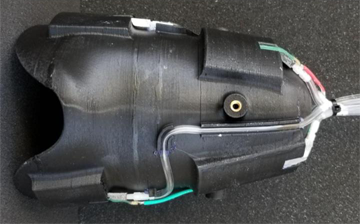
2023 Challenge Winners
“This year the DEBUT Challenge set a new record for participation with the largest number of entries we've ever seen. DEBUT students and mentors are working on many of the world's most pressing healthcare challenges, with prize-winning teams recognized for their exceptional ingenuity across a range of topics, including key advances in the rapidly growing area of technology for women's health.”
-Bruce Tromberg, Ph.D., NIBIB Director
NIBIB Sponsored Prizes

NIBIB Steven H. Krosnick Prize (First Prize): EpicPen, Purdue University, West Lafayette, Indiana
Nathan French, Victoria Sinfield, Nick Will, Brianna Shannon, Deepa Jayasankar
The EpicPen is a novel and accessible epinephrin auto-injector, a type of life-saving portable device used to treat anaphylactic reactions. Unlike other injectors, this device features a spring-loaded injection mechanism that enables the injector to be reused, significantly lowering the current high cost of multiple injections.

NIBIB Second Prize: Feminora, University of California-Irvine
Anushka Chauhan, Jennifer Reyes, Shlok Bansal, Rohan Kunduru, Lucas Jones, Allison Friefeld, Joyce Chen, Jazmin Arias, Artin Rashidi
Feminora’s OneSpec is a vaginal speculum that improves on the traditional duck-bill design, which can cause pain by pinching vaginal tissue and can also cause a physician’s line of sight to become obstructed during pelvic exams. The new device applies even pressure along the vaginal walls while offering examining physicians a clear view.

NIBIB Third Prize: Breast MRI Biopsy Positioning and Immobilization Device, University of Wisconsin-Madison
Cameron Ashford, Emma Brower, Claire Swartz, Helen Treankler, Sam Herzog
This new device improves both the efficacy of MRI-guided biopsies and patient comfort by positioning and immobilizing breasts of varying size and shape more effectively than the currently utilized apparatus.
NIH-sponsored prizes
“NCI is proud to support research into innovative therapies designed to improve cancer care. Funding young scientists through the DEBUT Challenge will help to deliver the latest in cancer innovations to patients and communities, one of the aims of the Biden-Harris Administration’s Cancer MoonshotSM.”
-Monica M. Bertagnolli, M.D., NCI Director

NIH OAR Prize for HIV/AIDS: FADpad, Georgia Institute of Technology, Atlanta
Netra Gandhi, Rhea Prem, Ethan Damiani
The filtered adhesive diagnostic pad, or FADpad, is a multi-layered menstrual pad add-on that can be placed onto any pad to collect menstrual blood samples. The user can store and ship the sample to a lab to be tested for human papillomavirus (HPV), which can cause cervical cancer — a cancer that is also closely linked to HIV.

NIMHD Healthcare Technologies for Low-Resource Settings Prize: DioTeX, Johns Hopkins University, Baltimore
Ellie Zhang, Feiyang Huang, Eric Simon
The DioTeX prototype is a portable rapid diagnostic assay that can detect blood biomarkers for trauma-induced hemorrhage to improve assessment and treatment of internal trauma. This testing device requires minimal training, making it easy to use in low-resource and rural settings.

NCI Technologies for Cancer Prevention, Diagnosis, or Treatment Prize: MiaFit, University of California-San Diego
Ritika Singh, German Gonzalez, Melina Tsotras, Stella Kotzabasakis
MiaFit is a low-cost expandable vaginal dilator designed to comfortably treat vaginal stenosis, a narrowing and shortening of the vagina that can cause significant pain and discomfort.

National Center for Medical Rehabilitation Research, NICHD Rehabilitative and Assistive Technologies Prize: Adjustable Prosthetic Socket, University of California-San Diego
Anton Gerasimov, Jay Chok, Savanna Turner
A new adjustable prosthetic socket is designed to adapt to the daily volume changes in the residual limbs of amputees using force sensing elements and air bladders, avoiding complications associated with poor fit such as sores and skin irritation.

NINR Technologies to Empower Nurses in Community Settings Prize: U-Sert, Clemson University, Clemson, South Carolina
Allie Beiter, Reagan Hamm, Maddie Thomas, Anna Wichmann
The U-Sert is a urinalysis insert that adheres to the interior of babies’ diapers to collect and test samples for urinary tract infections, providing a streamlined solution compared to current collection and diagnostic methods.
VentureWell-sponsored prizes

VentureWell Venture Prize: SteadyScrib, Northwestern University, Evanston, Illinois
Izzy Mokotoff, Alexis Chan, Priva Dave, Jamison Stout
The SteadyScrib pen set consists of a pen and clipboard designed to counteract Parkinson’s disease symptoms that inhibit writing through its wide grip, magnetic attraction between pen and board, and weighted core.

VentureWell Design Excellence Prize: SpasTECH, New Jersey Institute of Technology, Newark
Cole Bienert, Hayder Khan, Ashwin Kurian, Roark McFadden, William Kroeger
The SpasTECH Spastic Arm Simulator is a 3D-printed mechanical arm that can mimic motions associated with the neuromuscular condition spasticity and potentially serve as a teaching tool for clinicians to improve the reliability and objectivity of spasticity assessments.
Honorable Mentions
Rava One, Dartmouth College, Hanover, New Hampshire
Rava One: The SmartScope is a microscope that features both AI and telepathology capabilities to accelerate cancer diagnostics in low-resource communities.
HIVigilance, University of Washington, Seattle
HIVigilance is an affordable, high-throughput diagnostic tool tailored to test for HIV drug resistance in low-resource settings, providing critical information to help clinicians prescribe effective treatment regimens.
Enginuity, University of Michigan, Ann Arbor
Enginuity’s Fast-Cath offers a new method of draining and irrigating the bladders of patients with neurogenic bladder disorder that is more effective, efficient, and accessible than the current approach.
CaptaEEG, Arizona State University, Tempe
CaptaEEG helps users manage attention deficit hyperactivity disorder (ADHD) symptoms by monitoring brainwave patterns and providing vibrational feedback to enhance user focus and attention through a connected mobile app.
Sanibag, University of Toledo, Toledo, Ohio
Sanibag is a colostomy bag that can be cleaned much easier than traditional bags.
Related News
The National Institutes of Health and the higher education non-profit VentureWell have selected 11 winners and five honorable mentions in the Design by Biomedical Undergraduate Teams (DEBUT) Challenge, who are set to receive prizes totaling $160,000.
A team of undergraduate researchers at UT Tyler have received $481,440 in funding from NIBIB. The focus of their research is developing formulations and algorithms to increase the speed and accuracy of ultrasound imaging so that it might one day be used to treat tumors. Source: KLTV
NIBIB is marking the 10-year anniversary of a commercialization program that helps innovators bring their medical devices from the lab to the marketplace.


